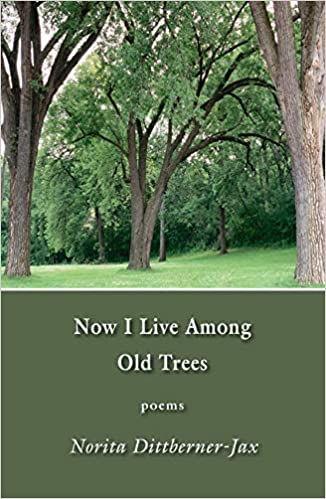| <- Back to main page |
In the six collections of poetry she has published so far, Norita Dittberner-Jax has written what may be close to an autobiography in verse. In the most recent installment, Now I Live Among Old Trees, we read of her husband Eugene’s final battle with ALS, his passing, and the poet’s own battle with cancer. There is no mistaking the darker shadows and sense of dwindling in these poems. “Suitcase”, placed like a calling card at the front of the book, sets her reality before us with the perfect metaphor:

They carry the suitcase of loss,
and now I am with them,
and you are one of the ghosts
The book is filled with haunting lines, like these from “Triptych: Cemetery”:
There are no streetlights in the land
of the dead.
And yet the collection as a whole is—somehow—not depressing. Dittberner-Jax has opened her suitcase wide, and taken out luminous scenes from past and present. “State Fair” (first published in Whistling Shade) pictures the fifteen-year-old Norita selling wind-up toys at the Fair as she is romanced the snowcone boy. The title poem recalls her college days at St. Catherine—a neighborhood that she has now moved back to. It is a poem of gratitude—and a little regret:
I went to a fine school for women
and graduated, thinking privilege
belonged to others. Like an arrow,
my life took off—the friends
who helped me in the crossing
I never saw them again. I never did.
And then there are those odd little poems about nothing much that simply delight. In “Night Flying” Dittberner-Jax views the little red and green lights of her printer, phone and other devices as though she is flying high above:
a little town I’m flying over
night bending the arc
of earth to air.
The first section of Now I Live Among Old Trees is titled “Make Something of This”, and the phrase seems almost like a challenge to the reader. Dittberner-Jax may give us glimpses into her life and the beautiful world around her, but she always leaves it to the reader to distill some meaning. This is one of those books meant to be read a little at a time—read and pondered. I would recommend doing both in the comfortable shade of an old tree, preferably an oak, perhaps in a cemetery. No suitcase needed.
- Joel Van Valin 